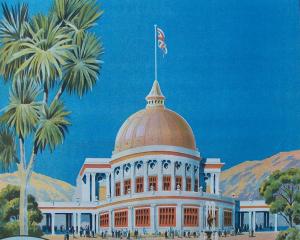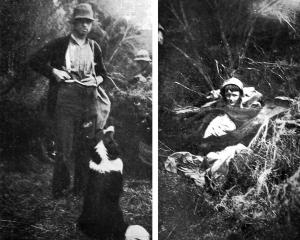
First, on the Friday afternoon the school pupils had their annual competition in reading, recitation, etc., and in the evening the prizes were given out. Then the annual school and district horticultural show was opened. On Saturday teachers gathered from all quarters, and at noon when the day’s proceedings commenced there were nearly 40 present, including visitors from Dunedin. First, but just too late to see the machinery in motion, the visitors were piloted through the Benhar Tile and Pottery Works, by Mr J. McK. Miller, the local head teacher, who has made himself quite conversant with all operations from winning the five different clays used in the varions articles made, to the pug and the finished glazed product stacked by the railway ready for the market. These works when in full swing employ 50 hands, and Dunedinites passing have no conception of the magnitude of the works. The glazing is a simple but little known process, salt being, of course the material used. It is placed on the fires and the fumes are made to traverse the kilns and in doing so the glazing is effected by the intense heat. An adjournment was then made to the district hall, where the School Committee’s contribution was in evidence for a sumptuous luncheon had been provided. The committee got the credit, but as in many other cases, the ladies were responsible for everything, and right royally did they do their part. They were asked to provide for about 20, but 40 sat down.
• At several places between Kahuika and Waikawa last week requests were made to the Hon. Sir F. H. D. Bell that the Native reserve land might be thrown open for settlement. At present it was unused, paid no rates, and blocked roading, settlement, and progress generally. The Minister said it could not be sold, but he would see if it could be settled under a long lease with the right of renewal. At Papatowai, Chaslands, Waikawa, and Quarry Hills local requests were made, and were promised consideration by the Government. At Slope Point the Minister was shown a large area of good Crown land unsettled, which helped to block connection with the railway at Tokanui. Further assistance towards making the road to Tokanui (for which Mr Malcolm had already secured votes of £1200 — the last £600 unspent) was asked. At Mokoreta a large deputation suggested the cutting up of the runs at present leased by Mr John Begg and Mr James Begg, with fair compensation to the owners in recompense for the cancellation of their leases. Mr Foster said there were some 40,000 acres of good agricultural and pastoral land between Mokoreta and Clinton that would make excellent homes for returned soldiers. These lands were at present administered by the Clutha River Board and High School Reserves Board, which were not progressive bodies. In any event, it would be an advantage to have the lands administered by the Land Board. The cutting of them up would be an assistance to settlement and general progress.— ODT, 27.2.1917.
• COPIES OF PICTURE AVAILABLE FROM ODT FRONT OFFICE, LOWER STUART ST, OR WWW.OTAGOIMAGES.CO.NZ












